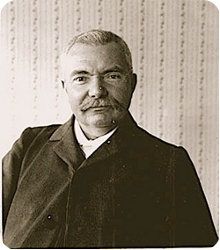A Quote by Katharine Fullerton Gerould
Each man's private conscience ought to be a nice little self-registering thermometer: he ought to carry his moral code incorruptibly and explicitly within himself, and not care what the world thinks. The mass of human beings, however, are not made that way; and many people have been saved from crime or sin by the simple dislike of doing things they would not like to confess.
Related Quotes
Once in his life, a man ought to concentrate his mind upon the remembered earth, I believe. He ought to give himself up to a particular landscape in his experience, to look at it from as many angles as he can, to wonder about it, to dwell upon it. He ought to imagine that he touches it with his hands at every season and listens to the sounds that are made upon it. He ought to imagine the creatures there and all the faintest motions of the wind. He ought to recollect the glare of noon and all the colors of the dawn and dusk.
Therefore the good man ought to be a lover of self, since he will then both benefit himself by acting nobly and aid his fellows; but the bad man ought not to be a lover of self, since he will follow his base passions, and so injure both himself and his neighbors. With the bad man therefore, what he does is not in accord with what he ought to do, but the good man does what he ought, since intelligence always chooses for itself that which is best, and the good man obeys his intelligence.
The cause of all the blunders committed by man arises from this excessive self-love. For the lover is blinded by the object loved; so that he passes a wrong judgment on what is just, good and beautiful, thinking that he ought always to honor what belongs to himself in preference to truth. For he who intends to be a great man ought to love neither himself nor his own things, but only what is just, whether it happens to be done by himself, or by another.
Vain men delight in telling what Honours have been done them, what great Company they have kept, and the like; by which they plainly confess, that these Honours were more than their Due, and such as their Friends would not believe if they had not been told: Whereas a Man truly proud, thinks the greatest Honours below his Merit, and consequently scorns to boast. I therefore deliver it as a Maxim that whoever desires the Character of a proud Man, ought to conceal his Vanity.
A human being is not one thing among others; things determine each other, but man is ultimately self-determining. What he becomes - within the limits of endowment and environment- he has made out of himself. In the concentration camps, for example, in this living laboratory and on this testing ground, we watched and witnessed some of our comrades behave like swine while others behaved like saints. Man has both potentialities within himself; which one is actualized depends on decisions but not on conditions.
But since there is but one aim for the entire state, it follows that education must be one and the same for all, and that the responsibility for it must be a public one, not the private affair which it now is, each man looking after his own children and teaching them privately whatever private curriculum he thinks they ought to study.
For A to sit down and think, What shall I do? is commonplace; but to think what B ought to do is interesting, romantic, moral, self-flattering, and public-spirited all at once. It satisfies a great number of human weaknesses at once. To go on and plan what a whole class of people ought to do is to feel one's self a power on earth, to win a public position, to clothe one's self in dignity. Hence we have an unlimited supply of reformers, philanthropists, humanitarians, and would-be managers-in-general of society.
Mirth is God's medicine. Everybody ought to bathe in it. Grim care, moroseness, anxiety,--all this rust of life, ought to be scoured off by the oil of mirth. It is better than emery. Every man ought to rub himself with it. A man without mirth is like a wagon without springs, in which one is caused disagreeably to jolt by every pebble over which it runs.



































